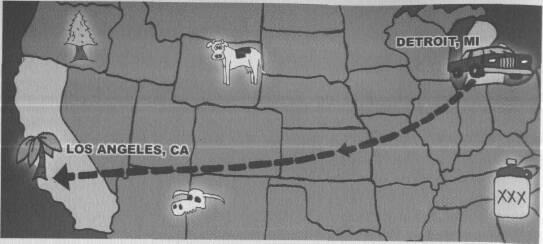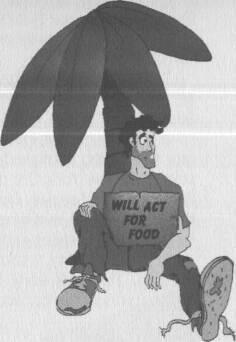If Chins Could Kill: Confessions of a B Movie Actor (32 page)
Read If Chins Could Kill: Confessions of a B Movie Actor Online
Authors: Bruce Campbell
Tags: #Autobiography, #United States, #General, #Biography & Autobiography, #Biography, #Entertainment & Performing Arts - General, #Entertainment & Performing Arts, #Actors, #Performing Arts, #Entertainment & Performing Arts - Actors & Actresses, #1958-, #History & Criticism, #Film & Video, #Bruce, #Motion picture actors and actr, #Film & Video - History & Criticism, #Campbell, #Motion picture actors and actresses - United States, #Film & Video - General, #Motion picture actors and actresses

This meant, however, that to assume a standing position, I would actually have to lie sideways, supported by a board. Above me, a fifty-five-gallon drum of fake blood was mounted -- with a bathtub-sized plug. The idea was to pull the plug and I'd get hit full force.
Sam: Okay, now Bruce, if something goes wrong and you're drowning, wave your arms.
Bruce: But that's what I'm supposed to be doing anyway -- how will you know the difference?
Sam looked at me blankly, then turned to the mechanical effects guy.
Sam: How long will the blood last?
Effects Guy: Long enough to empty fifty-five gallons.
Sam: Huh... good point... okay, let's shoot it!
I lived to tell the tale, but every time I blew my nose for the next two weeks, the snot was bright red.
Sam has never been one to stick to the industry standard of filming at twenty-four frames per second -- twenty-four frames to Sam is slow motion. Many sequences in the film were photographed at varying speeds to achieve different effects. One scene was filmed much as an animated scene would be done -- one frame at a time. This made it interesting for the actors, as we were forced to slow our motion down by twenty-four times...
Then there was the issue of reverse motion -- this effect can be used to inexpensively achieve strange and otherwise unattainable movements from actors. Watching dailies one night, during a scene in which I was assaulted by my former girlfriend's tongue (a scene deleted from the film), Sam pointed at the screen and shouted, "That's the worst reverse-motion acting I've ever seen!" -- something you would only hear on a Sam Raimi film.
The remaining weeks were spent spinning, getting doused with perhaps the highest volume of fake blood ever recorded on film and napping with a fly swatter. Out of sheer bullheadedness, I had insisted on using the original, time-tested Karo syrup formula from the first
Evil Dead
film. The visual effect was nice, but I became the object of desire for every fly in Wadesboro.
30
GO WEST, YOUNG MAN
Now that
Evil Dead II
was in the can, it dawned on us that we should get our butts out to Los Angeles, permanently, and have a go at it.
One of the tools of an actor's trade is the demo reel -- a collection of scenes that highlight whatever it is you think you can do best. Fortunately, I had the footage from three films available and put together a serviceable presentation.
Armed with this, and a new batch of head shots, I reconnected with the manager I met years before and he took me under his wing. His first duty, aside from masterminding my career, was to help me get an agent.
The process starts by meeting with any agency your manager can get you into -- those that find you "marketable" will invite you back. These "callbacks" usually take place in the agency boardroom and the goal is to charm the pants off every agent in the room because, in many cases, they won't take you on unless they all agree. The questions come fast and furious:
"How do you feel about TV, Bruce?"
"I never thought about it."
"You should. It's a great way for a mass audience to become familiar with you, and it makes it easier for us to place you in bigger features "
"Oh, okay, I..."
"What do you see yourself doing, Bruce?"
"Well, I've been doing independent features, so more of those would be fine..."
That's the point where all the agents in the room exchanged nervous glances, because I had just signaled to them that I might not be the cash cow they were hoping for.
"Sure, independent features are a great place to start Bruce," an agent offered, "but where do you see yourself going eventually?"
That was a great question, but I didn't have the answer. The idea of chasing the Holy Grail of fame and fortune never crossed my mind. I had moved my young family to California because it seemed like a logical progression, but to assume that I would immediately skyrocket to fame seemed absurd.
"I'm a working stiff actor," I told them. "I just want to work."
"So, you
will
do television?"
"Sure, I guess so..."
Apparently, that was the right answer, because the agency hired me.
Flush with cash from the sequel, I promptly bought what was most likely the last house in Southern California priced under one hundred thousand dollars -- a "great starter home" on Delight street in the outlying community of Canyon Country.
Getting accustomed to the insanity of California real estate was the biggest adjustment I had to make in moving west. Back home, I gave up a two-story home on a tree-lined street, in a good location that had cost thirty-five thousand dollars -- now I had a single-story home on the edge of the desert with a dirt backyard for three times that much.
Well, I'm here,
I thought to myself.
I'll give it a go and see what happens.
To my amazement, I got the first acting job I auditioned for -- a supporting role on the waning television show,
Knots Landing.
As the makeup man surveyed my face, I sensed that something was very wrong.
"I think we should pluck between your eyebrows," he said, with the bedside manner of a field nurse.
"Really, why would you do that?"
"Because you'll look far more intelligent."
Foolishly, I let him do this, but he had other ideas and rummaged in his bag for a small container called Mellow Yellow.
"This gets rid of all the red blotches," he explained. "Errol Flynn would have had no career without it..."
With that, he proceeded to cover up every wrinkle, blotch and inconsistency on my entire face. It didn't really matter to him what type of character I was playing, he was more concerned with fulfilling the TV mantra -- make everyone look perfect.
That episode, filmed on the old MGM lot, was an eye-opener -- the
speed
and clinical nature of it boggled my mind. Michelle Lee, the leading lady, ran the set like a drill sergeant and laid out all the blocking.
Isn't that the director's job?
I asked myself.
After the first take, the director looked to his camera crew.
"Okay with you guys?"
"Yep. Good for us."
"Cool. Print it -- let's move on..."
One take? Are these people out of their minds?
I was used to ten, fifteen or twenty takes to get a shot right. This wasn't filmmaking, this was posing in front of the camera.
When I got home after that first day, my wife, Cris, chuckled at me.
"You look prettier than I do."
I didn't have another TV job for six years...
Revelation #1A:
The Hollywood term "Dream Factory" is true -- or at least the
Factory
part.
Meanwhile, cash was running out -- the
Knot's Landing
gig plugged a tiny hole in my financial dike, but I had to find another job fast. My son, Andy, was born not long after arriving in Los Angeles. Aside from the elation that comes with being a father the second time around, I was struck by the realization that my financial obligations were mounting.
Before things got ugly, I got a call from a director, Bill Lustig, whom I had met during our
Evil Dead
sales days. He had just seen the release of
Evil Dead II
in a theater and was convinced that I was perfect for his next film,
Maniac Cop.
"You're a cop, see, and you're mistaken for another cop who comes back from the dead to get revenge on all the bad cops who set him up. Sound good?"
It was a ludicrous idea, but Mr. Bank Account convinced me to take the job. Next thing I knew, I was weaving through a massive crowd on the streets of New York City during the St. Patrick's Day parade, shooting my first "non-boys" movie. Despite myself, I felt like an adult.
Maniac Cop
was the perfect job at that time, but I was so in debt that I wound up flat broke by the time the shoot ended.
At the cast party, I said my good-byes and slipped out about 11:30 that evening. This was early for a Hollywood party, but my security guard uniform was in the car and I had to report for work at midnight.
ON GUARD
Back in Michigan, I filled income gaps with the occasional odd job. Broke once again, I considered the options and decided that being a security guard at night would fit the bill just fine -- if I had an audition during the day, I could always drag my butt out of bed and make it happen. Aside from that, I got to wear a costume...
In the office of Desert Patrol Security Services, an employment officer reviewed my application with confusion.
"It says here, Mr. Campbell, that you made $125,000 last year. Is that true?"
"Yes, sir."
"Then what are you doing
here?"
"That was last year." I'm sure he figured me for a closet alcoholic, but I got my assignment: the midnight to 8 A.M. shift, Gate 2 at the Anheuser-Busch plant in the San Fernando Valley -- effective immediately.
So, there I was -- guarding beer. Frankly, I was hoping to snag a boring assignment at some obscure part of the facility, but that's not my lot in life -- Gate 2 was the trucking gate and all vehicles coming in or out of the plant had to pass by us. Each night, for eight hours, we had to tag and weigh a never-ending stream of trucks hauling Beechwood ("Beechwood Aged," just like the ads say), grain and beer. My gate partner and I got along pretty well until he recognized me.





